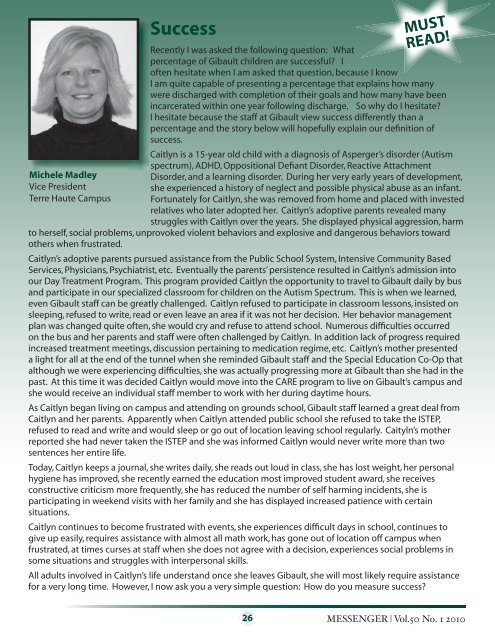Gibault Children's Services - Gibault, Inc.
Gibault Children's Services - Gibault, Inc.
Gibault Children's Services - Gibault, Inc.
Create successful ePaper yourself
Turn your PDF publications into a flip-book with our unique Google optimized e-Paper software.
Michele Madley<br />
Vice President<br />
Terre Haute Campus<br />
Success<br />
MUST<br />
READ!!!!<br />
Recently I was asked the following question: What<br />
percentage of <strong>Gibault</strong> children are successful? I<br />
often hesitate when I am asked that question, because I know<br />
I am quite capable of presenting a percentage that explains how many<br />
were discharged with completion of their goals and how many have been<br />
incarcerated within one year following discharge. So why do I hesitate?<br />
I hesitate because the staff at <strong>Gibault</strong> view success differently than a<br />
percentage and the story below will hopefully explain our defi nition of<br />
success.<br />
Caitlyn is a 15-year old child with a diagnosis of Asperger’s disorder (Autism<br />
spectrum), ADHD, Oppositional Defi ant Disorder, Reactive Attachment<br />
Disorder, and a learning disorder. During her very early years of development,<br />
she experienced a history of neglect and possible physical abuse as an infant.<br />
Fortunately for Caitlyn, she was removed from home and placed with invested<br />
relatives who later adopted her. Caitlyn’s adoptive parents revealed many<br />
struggles with Caitlyn over the years. She displayed physical aggression, harm<br />
to herself, social problems, unprovoked violent behaviors and explosive and dangerous behaviors toward<br />
others when frustrated.<br />
Caitlyn’s adoptive parents pursued assistance from the Public School System, Intensive Community Based<br />
<strong>Services</strong>, Physicians, Psychiatrist, etc. Eventually the parents’ persistence resulted in Caitlyn’s admission into<br />
our Day Treatment Program. This program provided Caitlyn the opportunity to travel to <strong>Gibault</strong> daily by bus<br />
and participate in our specialized classroom for children on the Autism Spectrum. This is when we learned,<br />
even <strong>Gibault</strong> staff can be greatly challenged. Caitlyn refused to participate in classroom lessons, insisted on<br />
sleeping, refused to write, read or even leave an area if it was not her decision. Her behavior management<br />
plan was changed quite often, she would cry and refuse to attend school. Numerous diffi culties occurred<br />
on the bus and her parents and staff were often challenged by Caitlyn. In addition lack of progress required<br />
increased treatment meetings, discussion pertaining to medication regime, etc. Caitlyn’s mother presented<br />
a light for all at the end of the tunnel when she reminded <strong>Gibault</strong> staff and the Special Education Co-Op that<br />
although we were experiencing diffi culties, she was actually progressing more at <strong>Gibault</strong> than she had in the<br />
past. At this time it was decided Caitlyn would move into the CARE program to live on <strong>Gibault</strong>’s campus and<br />
she would receive an individual staff member to work with her during daytime hours.<br />
As Caitlyn began living on campus and attending on grounds school, <strong>Gibault</strong> staff learned a great deal from<br />
Caitlyn and her parents. Apparently when Caitlyn attended public school she refused to take the ISTEP,<br />
refused to read and write and would sleep or go out of location leaving school regularly. Caityln’s mother<br />
reported she had never taken the ISTEP and she was informed Caitlyn would never write more than two<br />
sentences her entire life.<br />
Today, Caitlyn keeps a journal, she writes daily, she reads out loud in class, she has lost weight, her personal<br />
hygiene has improved, she recently earned the education most improved student award, she receives<br />
constructive criticism more frequently, she has reduced the number of self harming incidents, she is<br />
participating in weekend visits with her family and she has displayed increased patience with certain<br />
situations.<br />
Caitlyn continues to become frustrated with events, she experiences diffi cult days in school, continues to<br />
give up easily, requires assistance with almost all math work, has gone out of location off campus when<br />
frustrated, at times curses at staff when she does not agree with a decision, experiences social problems in<br />
some situations and struggles with interpersonal skills.<br />
All adults involved in Caitlyn’s life understand once she leaves <strong>Gibault</strong>, she will most likely require assistance<br />
for a very long time. However, I now ask you a very simple question: How do you measure success?<br />
26 MESSENGER | Vol.50 No. 1 2010



